Trivago Bundle
Can Trivago Reclaim Its Growth in the Competitive Travel Market?
Founded in 2005, Trivago revolutionized hotel search, expanding to nearly 200 countries and generating billions in revenue. As a leading Trivago SWOT Analysis reveals, the online travel agency landscape is fiercely competitive. This analysis dives into Trivago's journey, its current standing, and what strategies it's employing to secure its future.
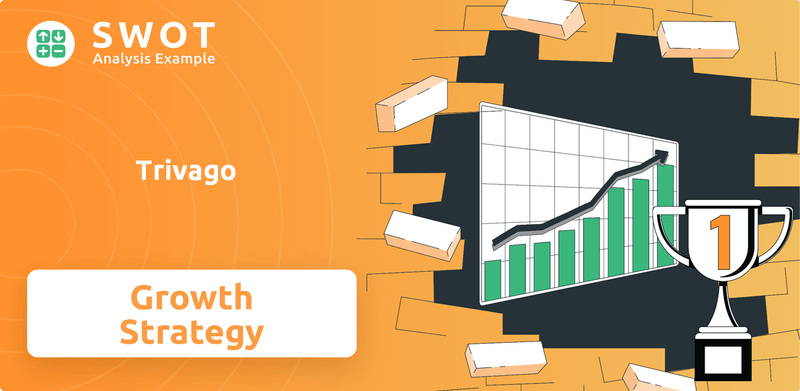
Trivago's recent return to revenue growth in late 2024 signals a potential turning point, but the path ahead requires a sharp focus on its Trivago growth strategy. Understanding the company's future prospects involves a deep dive into its expansion plans, technological innovations, and financial outlook within the dynamic travel industry. This comprehensive Trivago company analysis will explore both the opportunities and challenges facing the hotel booking platform.
How Is Trivago Expanding Its Reach?
The company's growth strategy in 2025 centers on expanding its business and driving future growth. A key focus is the evolution and expansion of 'trivago Book & Go,' a booking funnel designed for its partners. This initiative aims to enhance conversion rates and competitiveness for advertising partners by providing a more consistent booking experience. This approach is critical for the company's long-term success in the competitive online travel agency market.
Trivago's future prospects are significantly influenced by its strategic investments and marketing efforts. The company is also committed to scaling its brand marketing activities globally to reach a larger audience and positively impact overall revenues long-term. These efforts are expected to contribute to strong double-digit revenue growth across all segments observed in January and April 2025. A deep dive into Trivago's mission and values provides further insight into the company's strategic direction.
The company's commitment to innovation and strategic partnerships positions it well to capitalize on travel industry trends and maintain a competitive edge. By focusing on user experience, partner success, and global expansion, the company aims to solidify its position in the online travel market.
The evolution of 'trivago Book & Go' is a key initiative. This facilitated booking funnel aims to increase conversion rates for advertising partners. The goal is to offer a more consistent and enhanced booking experience, driving competitiveness.
Strategic investment in Holisto, an AI-driven travel tech platform, is crucial. This allows 'trivago Book & Go' to be available to all advertising partners. Holisto's expertise in rate optimization and price accuracy, leveraging AI, is expected to deliver value.
Focus on retaining price-savvy users is a priority. New functionalities are being introduced to simplify the metasearch proposition. Exclusive deals are extended to signed-on members to incentivize them to choose the platform.
Scaling brand marketing activities globally is essential for reaching a larger audience. New AI-powered marketing campaigns, featuring brand ambassador Jürgen Klopp, launched in early 2025. These campaigns are active in over 23 key travel markets.
The company is focused on expanding its business through several key initiatives. These include enhancing the booking funnel, leveraging AI for rate optimization, and implementing user retention strategies. Global brand marketing campaigns are also a significant part of the expansion plan.
- Evolution of 'trivago Book & Go' to improve booking experience.
- Integration of Holisto's AI-driven technology for rate optimization.
- Introduction of new functionalities to retain price-savvy users.
- Global brand marketing campaigns to reach a wider audience.
Trivago SWOT Analysis
- Complete SWOT Breakdown
- Fully Customizable
- Editable in Excel & Word
- Professional Formatting
- Investor-Ready Format
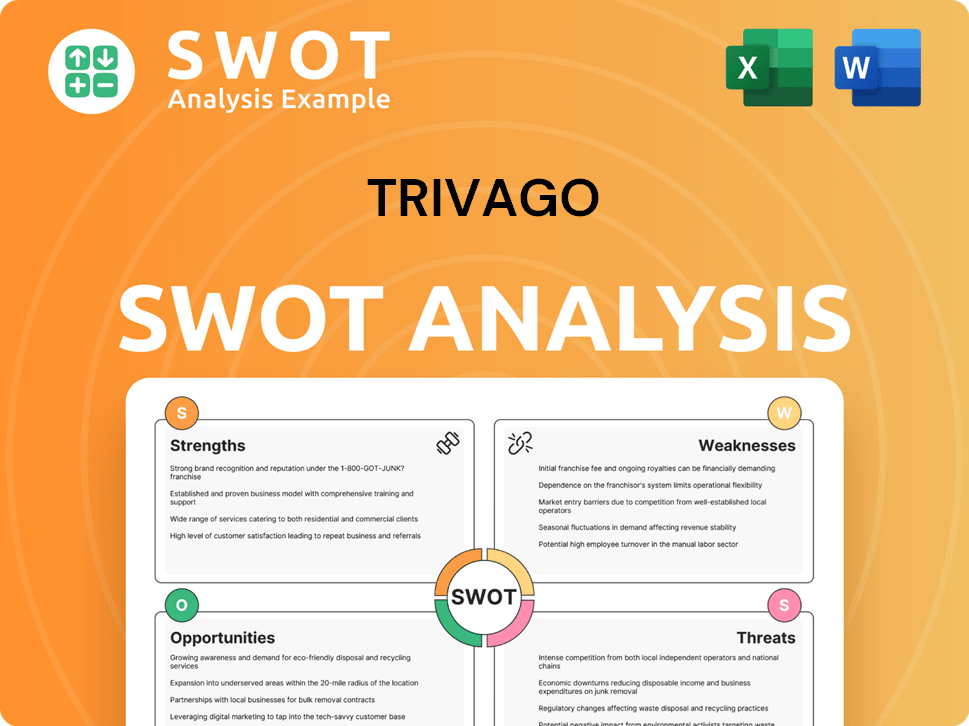
How Does Trivago Invest in Innovation?
Understanding the innovation and technology strategy is crucial when conducting a thorough analysis of the Owners & Shareholders of Trivago. This strategy directly impacts the company's ability to compete in the dynamic online travel agency market. The focus on technological advancements and user experience is central to its long-term growth.
The company's approach to technology and innovation is designed to enhance its position in the competitive landscape. By investing in personalization, AI, and strategic partnerships, the company aims to improve user engagement and drive conversion rates. These efforts are essential for maintaining a strong market presence.
The company's commitment to innovation is evident in its continuous platform enhancements and the integration of new features. These initiatives are aimed at improving user experience and boosting conversion rates, which are critical for sustained growth. Furthermore, the company’s strategic alliances and AI-driven solutions are designed to provide more value to both travelers and partners.
The company consistently runs experiments on its platform to improve user experience. This includes features designed to make the booking process more intuitive and efficient. These improvements directly contribute to higher conversion rates.
The company is investing in AI-driven marketing campaigns, such as those featuring Jürgen Klopp. These campaigns are designed to tailor messages across various markets and languages. Early results have shown promising outcomes in terms of engagement and reach.
The company has partnered with Holisto, an AI-driven travel tech platform. This collaboration aims to enhance the booking experience through advanced AI and machine learning. The goal is to optimize real-time aggregation of hotel rates and improve price accuracy.
Significant investments are being made in personalizing search results. This involves using data and AI to provide users with more relevant and tailored hotel recommendations. The aim is to increase user satisfaction and booking conversions.
The company is developing a differentiated member proposition. This initiative aims to attract price-savvy travelers to start their journey on the platform. This strategy is designed to compete with other search engines and generative AI applications.
Ongoing investments in product enhancements and AI initiatives are crucial for maintaining a competitive edge. These investments support the company's growth objectives by improving the platform's functionality and user experience. This approach is vital for the long-term success of the company.
The company's technological advancements are focused on enhancing user experience and driving growth. These advancements include AI-powered features and strategic partnerships. The company's commitment to innovation is essential for its future prospects.
- AI Integration: Utilizing AI to personalize search results and improve marketing campaigns.
- Strategic Partnerships: Collaborating with companies like Holisto to enhance booking experiences.
- Product Enhancements: Continuously improving the platform's features to increase user engagement.
- Member Proposition: Developing a differentiated offering to attract price-conscious travelers.
Trivago PESTLE Analysis
- Covers All 6 PESTLE Categories
- No Research Needed – Save Hours of Work
- Built by Experts, Trusted by Consultants
- Instant Download, Ready to Use
- 100% Editable, Fully Customizable
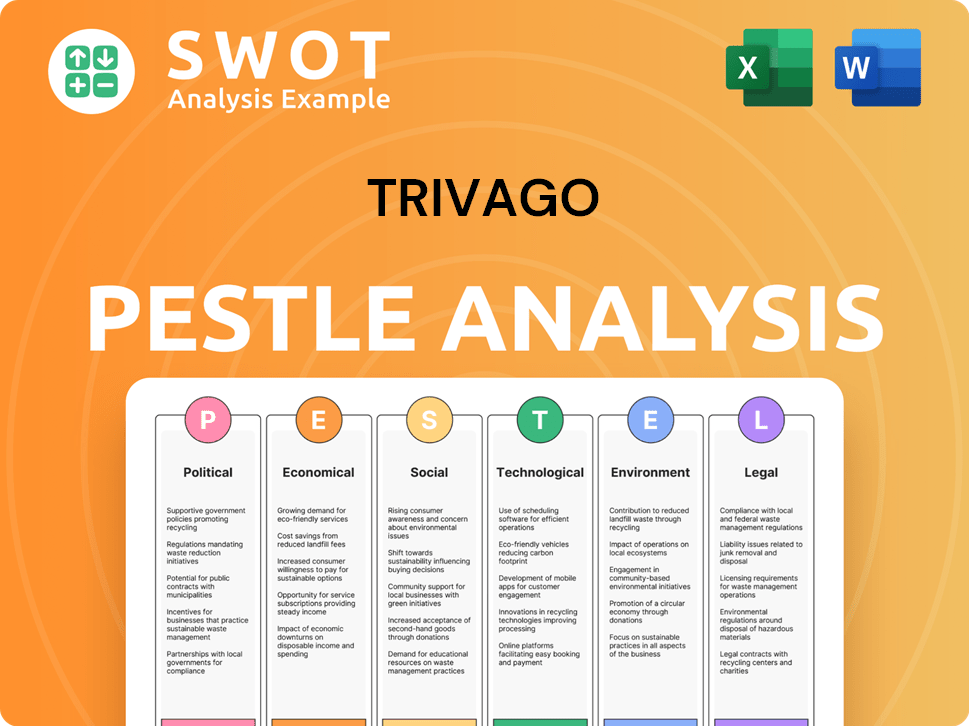
What Is Trivago’s Growth Forecast?
The financial outlook for the company in 2025 is focused on significant revenue growth and a return to profitability, representing a positive trajectory for the Trivago growth strategy. This follows a pivotal point in Q4 2024, where the company achieved 3% top-line growth and an Adjusted EBITDA of €11.1 million. The positive momentum has continued into 2025, with the company showing strong performance in the first quarter.
Initially, the company projected total revenues to increase by at least a high single-digit percentage for the full year 2025 compared to 2024, with an aim to achieve at least breakeven Adjusted EBITDA. However, due to better-than-expected results in Q1 2025, the company has revised its full-year revenue growth guidance to a mid-teens percentage range year-over-year. This indicates a stronger-than-anticipated recovery and expansion within the online travel agency market.
The company anticipates achieving positive Adjusted EBITDA for the full year 2025, mirroring the performance of 2024, which saw roughly €10 million. Despite reporting a net loss of €7.8 million and an adjusted EBITDA loss of €6.5 million in Q1 2025, these figures were better than internal expectations. The company anticipates positive Adjusted EBITDA in Q3 and Q4 2025, following a similar pattern to 2024. This demonstrates effective financial management and strategic planning within the hotel booking platform sector.
The company has raised its full-year revenue growth guidance to a mid-teens percentage range for 2025. This is a significant increase from the initial expectation of high single-digit growth, reflecting strong performance in Q1 2025, where revenue grew 22% to €124.1 million. This positive trend suggests robust expansion plans and effective user acquisition strategies.
The company expects to achieve positive Adjusted EBITDA for the full year 2025, similar to 2024's performance. While Q1 2025 showed an adjusted EBITDA loss, the company anticipates positive results in the third and fourth quarters. This financial strategy supports the company's investment potential.
Trivago plans to continue reinvesting profits into its marketing strategy, including increased advertising spend. In Q1 2025, advertising spend increased by 24% to €104.5 million. This investment is aimed at maintaining positive momentum and scaling global marketing efforts, crucial for customer retention tactics.
The company maintains a strong financial position, with over €130 million in cash at the end of 2024 and no long-term debt. This solid financial foundation supports its growth initiatives and provides stability in a competitive market. For a deeper understanding, you can read a Brief History of Trivago.
Analysts project that the company will return to profitability in 2025, with an estimated EPS of $0.06 for FY2025. This positive outlook indicates confidence in the company's ability to navigate travel industry trends and achieve sustainable growth. The company's Trivago future prospects look promising.
The company's strategic investments in marketing and technology, along with its focus on revenue growth and profitability, are expected to have a continued impact on the hotel industry. This includes influencing booking patterns, driving competition, and potentially shaping Trivago's technological advancements.
Trivago Business Model Canvas
- Complete 9-Block Business Model Canvas
- Effortlessly Communicate Your Business Strategy
- Investor-Ready BMC Format
- 100% Editable and Customizable
- Clear and Structured Layout
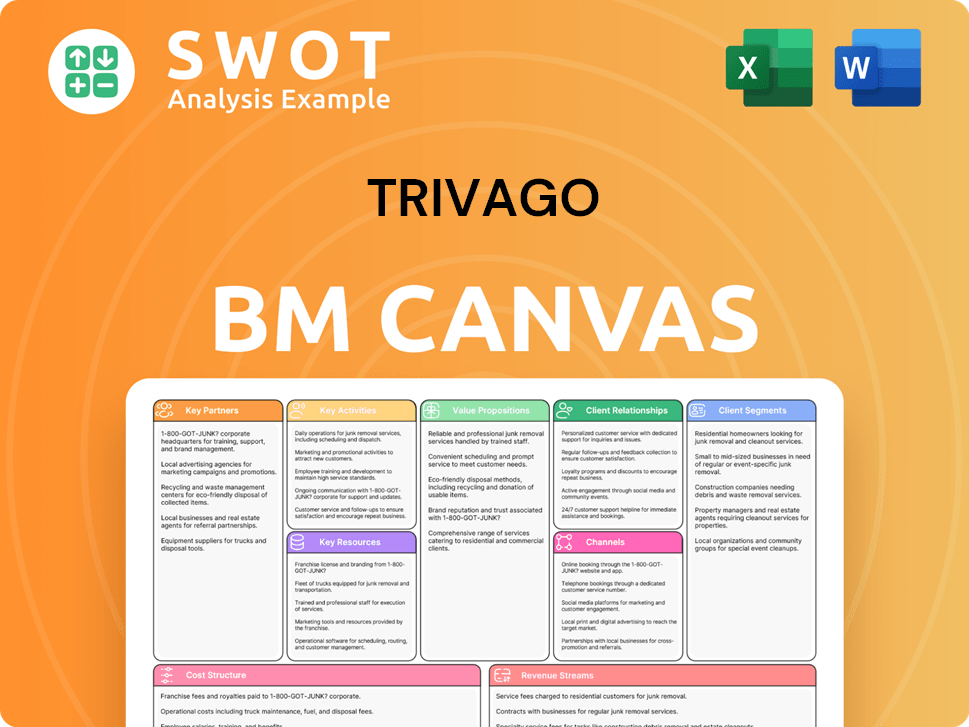
What Risks Could Slow Trivago’s Growth?
The future of the company, while promising, faces several potential risks and obstacles. The intense competition within the online travel agency and hotel booking platform sector, with major players vying for market share, presents a significant challenge. Continuous strategic initiatives are necessary for the company to maintain and expand its user base.
Another key risk stems from the company's reliance on online advertising, which accounts for a substantial portion of its revenue. This dependency makes the company vulnerable to fluctuations in advertising budgets, increasing advertising expenses, and changes in the broader advertising market. Furthermore, regulatory changes and potential legal actions could impact the company.
Macroeconomic uncertainties, including inflationary pressures and slowing consumer spending, could negatively impact discretionary travel demand. Ongoing vigilance and robust risk management frameworks are essential for navigating these potential obstacles. The company's strategy of diversifying its offerings and continuously improving its core product and brand marketing efforts helps mitigate some of these risks.
The online travel market is highly competitive, with major players like Booking.com, Expedia, and Airbnb. These companies have significant resources and established brand recognition, which can hinder the company's market share growth. Understanding the Trivago company analysis is crucial for investors.
The company heavily relies on online advertising for revenue generation. Fluctuations in advertising costs and the effectiveness of ad campaigns can significantly impact profitability. In Q1 2025, advertising spend increased by 24% compared to Q1 2024, raising concerns about long-term financial performance.
Regulatory changes, including those related to data privacy and consumer protection, pose a risk. Legal actions related to deceptive advertising or non-compliance can lead to financial penalties. The company must ensure compliance to avoid reputational damage and financial losses.
Macroeconomic factors, such as inflation and changes in consumer spending, can affect travel demand. A downturn in the economy could lead to a decrease in bookings and revenue. The company needs to be prepared to adapt to changing economic conditions.
Maintaining technological infrastructure and cybersecurity is crucial. Any disruption or data breach can damage the company's reputation and lead to financial losses. The company must invest in robust systems to protect user data and ensure operational stability.
Changes in travel trends and consumer preferences can affect demand for the company's services. The company must stay agile and adapt its offerings to meet evolving customer needs. Monitoring travel industry trends is essential for long-term success.
Trivago Porter's Five Forces Analysis
- Covers All 5 Competitive Forces in Detail
- Structured for Consultants, Students, and Founders
- 100% Editable in Microsoft Word & Excel
- Instant Digital Download – Use Immediately
- Compatible with Mac & PC – Fully Unlocked
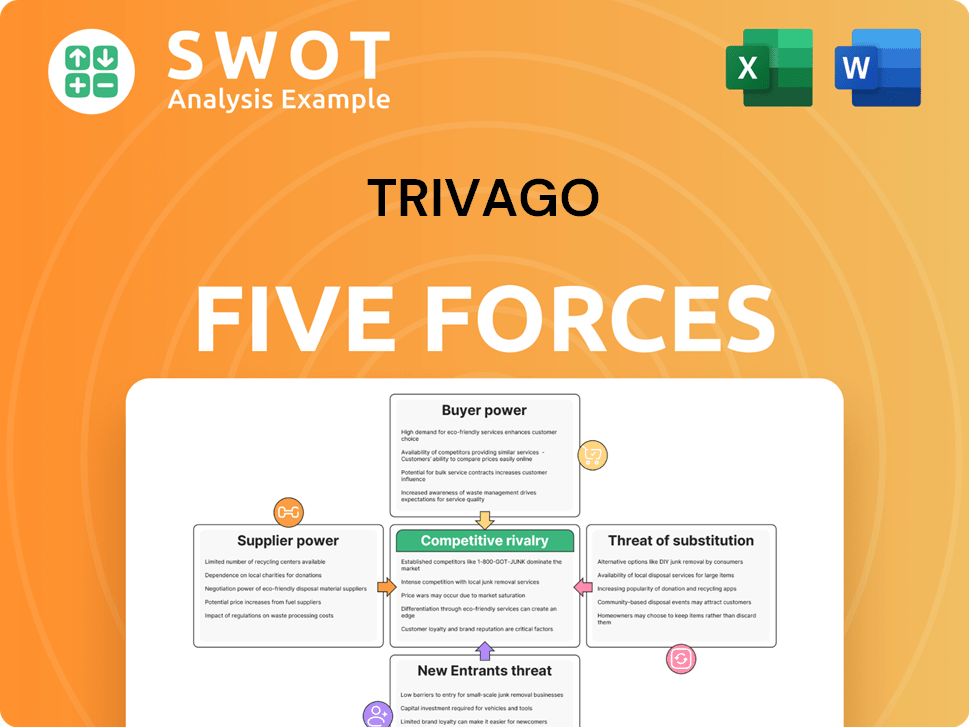
Related Blogs
- What are Mission Vision & Core Values of Trivago Company?
- What is Competitive Landscape of Trivago Company?
- How Does Trivago Company Work?
- What is Sales and Marketing Strategy of Trivago Company?
- What is Brief History of Trivago Company?
- Who Owns Trivago Company?
- What is Customer Demographics and Target Market of Trivago Company?
Disclaimer
All information, articles, and product details provided on this website are for general informational and educational purposes only. We do not claim any ownership over, nor do we intend to infringe upon, any trademarks, copyrights, logos, brand names, or other intellectual property mentioned or depicted on this site. Such intellectual property remains the property of its respective owners, and any references here are made solely for identification or informational purposes, without implying any affiliation, endorsement, or partnership.
We make no representations or warranties, express or implied, regarding the accuracy, completeness, or suitability of any content or products presented. Nothing on this website should be construed as legal, tax, investment, financial, medical, or other professional advice. In addition, no part of this site—including articles or product references—constitutes a solicitation, recommendation, endorsement, advertisement, or offer to buy or sell any securities, franchises, or other financial instruments, particularly in jurisdictions where such activity would be unlawful.
All content is of a general nature and may not address the specific circumstances of any individual or entity. It is not a substitute for professional advice or services. Any actions you take based on the information provided here are strictly at your own risk. You accept full responsibility for any decisions or outcomes arising from your use of this website and agree to release us from any liability in connection with your use of, or reliance upon, the content or products found herein.